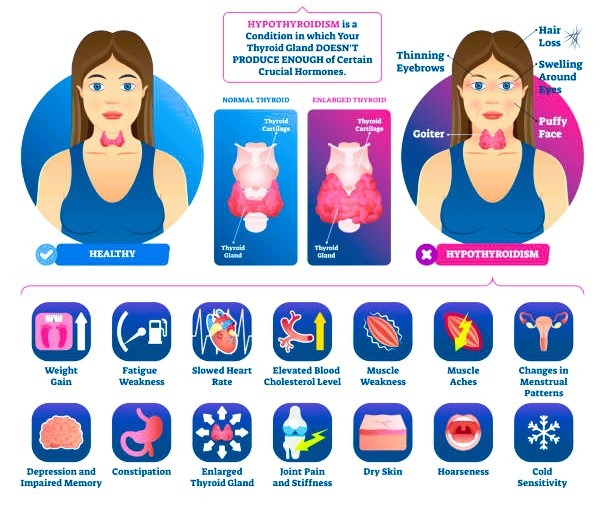Hypothyroidism: Impact on Menstrual Periods?
"Explore how hypothyroidism affects menstrual periods. Learn about symptoms, treatments, and how to manage your menstrual health with thyroid issues. #Hypothyroidism."


Impact of Hypothyroidism on Menstrual Periods
Hypothyroidism, characterized by an underactive thyroid gland, significantly impacts various bodily functions, including menstrual health. The thyroid gland produces hormones that regulate metabolism, but these hormones also play a crucial role in reproductive health. When the thyroid is underactive and produces insufficient levels of thyroid hormones, it can disrupt the balance of reproductive hormones, leading to menstrual irregularities.
One of the most common effects of hypothyroidism on menstrual cycles is the alteration of menstrual flow. Women with hypothyroidism may experience heavy menstrual periods (menorrhagia), where bleeding is excessively prolonged or profuse. Conversely, some may face scanty or light periods (oligomenorrhea), where menstrual flow is minimal. Irregular menstrual cycles are also prevalent, with periods occurring infrequently or unpredictably.
The physiological connection between thyroid function and menstrual health lies in the thyroid's influence on the hypothalamic-pituitary-ovarian (HPO) axis. The HPO axis governs the release of hormones necessary for ovulation and menstruation. Insufficient thyroid hormones can lead to an imbalance in this axis, disrupting the normal production of estrogen and progesterone. This hormonal imbalance can result in anovulation, where the ovary fails to release an egg, further contributing to menstrual irregularities.
Menstrual cycle irregularities can sometimes be an early indicator of hypothyroidism. Women experiencing unexplained changes in their menstrual patterns should consider evaluating their thyroid function. Early detection and treatment of hypothyroidism can mitigate its impact on menstrual health and improve overall well-being.
Furthermore, the changes in menstrual cycles due to hypothyroidism can affect fertility. Anovulation and irregular periods can make it challenging for women to conceive. The overall quality of life may also be compromised, as heavy or irregular periods can lead to physical discomfort, emotional stress, and reduced productivity. Therefore, maintaining thyroid health is essential for reproductive wellness and general quality of life.
Causes and Symptoms of Hypothyroidism
Hypothyroidism, a condition where the thyroid gland does not produce sufficient thyroid hormones, can stem from various causes. One of the most common causes is an autoimmune disorder known as Hashimoto's thyroiditis. In this condition, the immune system mistakenly attacks the thyroid gland, leading to inflammation and impaired function. Another prevalent cause is iodine deficiency, which is crucial for thyroid hormone production. Inadequate iodine intake can significantly disrupt thyroid function.
Certain medications can also induce hypothyroidism. Drugs like lithium, used to treat psychiatric disorders, and amiodarone, used for heart arrhythmias, are known to interfere with thyroid hormone production. Less common causes include genetic factors, radiation therapy for cancers of the head and neck, and surgical removal of the thyroid gland. These factors can all contribute to the onset of hypothyroidism, often requiring lifelong management.
The symptoms of hypothyroidism are diverse, affecting multiple bodily systems. Common physical symptoms include fatigue, weight gain, and dry skin. Hair loss and sensitivity to cold are also notable indicators. Emotional symptoms such as depression and memory issues frequently accompany these physical manifestations. Women, in particular, may experience specific health issues related to hypothyroidism. Menstrual irregularities such as heavier, more prolonged periods or, conversely, missed periods are common. Fertility problems may also arise, complicating efforts to conceive.
Understanding the broad spectrum of symptoms is vital for early diagnosis and effective management of hypothyroidism. Given the potential impact on menstrual health and overall well-being, individuals experiencing these symptoms should seek medical evaluation. Proper diagnosis and treatment can significantly improve quality of life and mitigate the complications associated with this condition.
Remedies and Management Strategies for Hypothyroidism
Managing hypothyroidism effectively involves a multifaceted approach that includes conventional treatments, lifestyle modifications, and alternative therapies. The cornerstone of traditional treatment is hormone replacement therapy, primarily using levothyroxine. This synthetic thyroid hormone helps normalize thyroid hormone levels in the body, alleviating symptoms and restoring normal metabolic function. Regular monitoring and dosage adjustments are crucial, as thyroid hormone needs can change over time due to factors like weight fluctuations, pregnancy, and aging.
In addition to medication, lifestyle changes play a vital role in supporting thyroid health. Dietary recommendations for individuals with hypothyroidism typically emphasize a balanced diet rich in nutrients that support thyroid function. Key nutrients include iodine, selenium, and zinc, which are essential for hormone production and metabolism. Foods such as fish, nuts, and dairy products are beneficial. Conversely, it is advisable to limit the intake of goitrogenic foods like soy, cruciferous vegetables, and gluten, which can interfere with thyroid function in some individuals. Regular exercise is another critical component, as it helps boost metabolism, maintain a healthy weight, and improve overall well-being. Stress management techniques such as yoga, meditation, and deep breathing exercises are also beneficial, as stress can negatively impact thyroid function.
Exploring alternative and complementary therapies can further enhance the management of hypothyroidism. Herbal supplements, such as ashwagandha and bladderwrack, have shown potential in supporting thyroid health, although it is essential to consult with a healthcare provider before starting any new supplement. Acupuncture is another complementary therapy that may aid in regulating thyroid function and alleviating symptoms. While these alternative treatments can be valuable, they should not replace conventional medical treatments but rather complement them as part of a comprehensive treatment plan.
By integrating traditional medical treatments with lifestyle modifications and alternative therapies, individuals with hypothyroidism can effectively manage their condition, maintain their overall health, and improve their quality of life.
